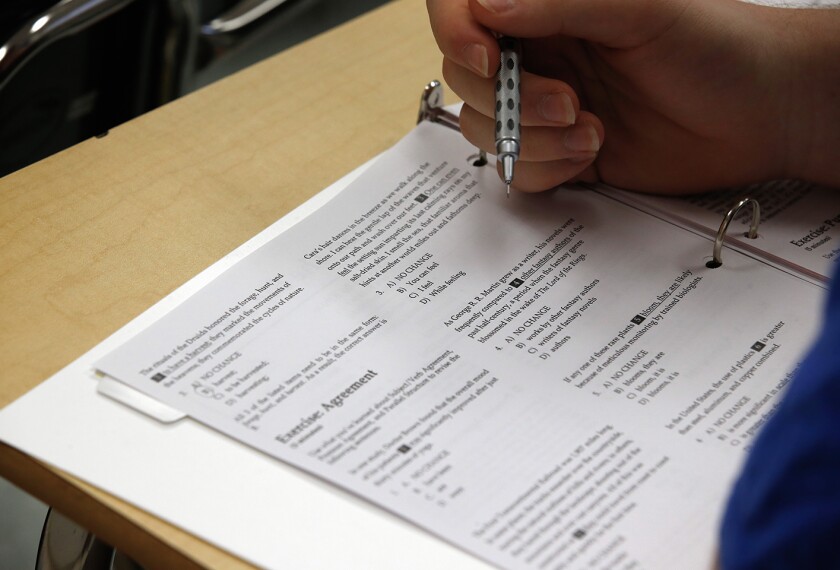
Princeton Review Inc. has taken its big admissions test on Wall Street. Its scores didn’t quite put it at the head of the class.
The well-known brand in test preparation completed its initial public offering of stock on June 19, the first company related to K-12 education to go public in more than a year. The offering was priced at $11 a share, at the low end of the range set by its underwriters, and the stock promptly fell 14 percent on its first day of trading to close at $9.50 a share.
Princeton Review Inc. |
| Founded: 1981 |
| Headquarters: New York City |
| 2000 revenues: $43.9 million |
| Stock range since June 19 initial public offering:$7.50 to $11.10 per share on NASDAQ. |
| July 5 closing price: $9.30 |
| Principal businesses: Admissions-test preparation classes and books; online test preparation at Web sites Review.com and Homeroom.com. |
The stock, trading under the symbol REVU on the NASDAQ stock market, dipped as low as $7.50 a share in the days to follow, but it has rebounded slightly, closing at $9.30 on July 5. The initial public offering of 5.4 million shares, or about 20 percent of the company, raised $59.4 million.
Princeton Review was founded in 1981, and is best known for its irreverent courses and books that help high school students prepare for college-admissions tests such as the SAT. Its decision to go public now stems from its major push into Internet-based services such as Review.com, which offers online versions of its test-preparation courses, and Homeroom.com, a service targeted at helping 3rd to 8th graders prepare for state tests.
A company spokeswoman said executives could not comment on the IPO last week because the “quiet period” required by the federal Securities and Exchange Commission as part of the process had not yet expired.
In its stock prospectus, Princeton Review said that to “increase our revenue growth, we will need to derive a substantial portion of our future revenue from our Internet businesses.”
Some analysts said that while the company’s offering did not overwhelm Wall Street, it was an accomplishment just to complete the IPO when it has been more than a year since the days of high-flying stock offerings, especially of Internet companies.
“The market is tough right now for any kind of new issue,” said Gregory Cappelli, an analyst who follows the education industry for the investment bank Credit Suisse First Boston. “Princeton Review has a good brand name. But one of the reasons it has struggled out of the box is it is just a difficult market for IPOs.”
Another concern, analysts said, was profitability, or Princeton Review’s lack of it. The company had a net loss of $8.2 million on revenues of $43.9 million in 2000. For the first three months of this year, the company racked up $2.9 million more in losses.
“We expect to incur operating losses and experience negative cash flow for the foreseeable future,” the company’s prospectus states. The losses stem from the costs of developing its Internet businesses, which have yet to contribute much revenue, the company says. Princeton Review has an accumulated deficit of $24 million.
“If you peel back the onion, they have built a lot of enthusiasm around Homeroom.com and their admissions business,” said Howard M. Block, an analyst who follows education companies for Banc of America Securities. “But they sort of diverted attention from their Princeton Review test-prep business, where you haven’t seen much growth over the past few years.”
Among the many “risk factors” discussed in its prospectus, the company warns that its core business could be hurt if many additional colleges and universities de- emphasize or eliminate SAT scores in the admissions process, as the president of the University of California system recently proposed doing.
Good News, Bad News
John S. Katzman, the 41-year-old founder and chief executive officer of Princeton Review, has been a longtime critic of the college-admissions tests. He started his test-preparation company just after graduating from Princeton University, which is not connected to the business.
His company, like its major competitor, Kaplan Inc., a unit of the Washington Post Co., is seemingly reliant on the nation’s obsession with educational testing to stay in business. The prospect of even more state testing as a result of the education bill now working its way through Congress is likely good news for services such as Homeroom.com.
So, looked at through one lens, Princeton Review is almost like a new Internet company at a time when such business models are not in favor on Wall Street. But looked at another way, it is an established brand that stands to benefit from an increased emphasis on testing.
Mr. Block, suggesting that simply getting the IPO done amounted to a passing score for Princeton Review, said that “the positive K-12 rhetoric overwhelmed the dot-bomb concerns.”




